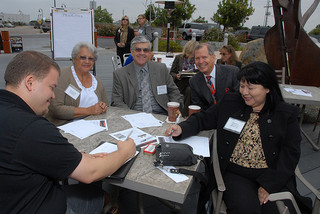
Do you leave halfway through a network because it wasn’t “good”? Are you sometimes the last to leave a network because you’re still chatting?
You need to know what “good” means for you before you go to any network event. How do you know? Here are 11 characteristics to know about it.
Characteristics of groups where you can network
- Target market Before you look at any group, know who your target market is. Are the people you’re looking for corporate HR, IT people, “mompreneurs”, small business owners or solopreneurs? Know this first.
2. Location. Where is it held? Is that too far for you get to? I live in downtown Toronto and don’t drive so a network in Barrie which is a town about 50 miles (85 km) north doesn’t work for me.
If it’s a conference in Los Angeles and you live in Boston, you would have to fly there. Can you afford the flight and hotel costs as well as the time away from your business. Would you get enough leads and build enough relationships to make it worth your while?
3. Time. Ahh time of day. I’m not a morning person so being self employed suits me fine. As soon as I see that it’s a breakfast meeting at 730 a.m. I look to see when else this group meets. Breakfast, lunch or early evening may make a difference to you — it does for me!
4. Size. Groups vary from 6 to 600. Do you thrive in a big group? Do you look for small intimate groups? Here’s where size does matter.
5. Cost. What does it cost per meeting and what do you get for it? The average is $25 but for a dinner meeting it could be up to $75 — be sure you get dinner.
6. Room Layout. It depends on the size of the group. The huge ones are standing only with a few chairs around the outside of the room; the medium to large have chairs in a traditional format in rows facing the speaker at the front; small ones could be held around tables or have the chairs set in a circle. Which one works best? It depends on you and what you’re comfortable in.
7. Do they do an “around the room”? You want maximum exposure for your “elevator pitch” so giving it to everyone in the room is better. It allows you to decide who you want to speak with and those who want to hear more about your business and perhaps use your services will come up to you. (This only happens with groups under 40.)
8. Speaker. Most groups have a speaker. You may want to hear that person or the topic.
9. Membership. How many times can you attend before you have to join? Or do you even have to become a member?

10. “Fixed or fluid”. Often called leads groups. BNI and BCX only accept people from different business types. For example if you’re a web designer and they have one, you’re not invited to join. You also are required to give leads every meeting and you may not have used the lead’s services so don’t know much about the company.
11. Type of group. Are they a networking group or an association? An association will be in your field so if you’re a startup you may want to learn from more experienced people.
Frequency of meetings. Groups usually get together once a month but leads groups meet twice a month. Do you have the time and money?
Look at each of these questions and get answers. Which characteristics are important to you? If you’re a startup you may want to attend every event you can until you find out what works best for you.
Remember that you need to attend each one several times to see if it’s what you want.
If you know other entrepreneurs you can ask them which groups they recommend. And you always have the internet where you can check the group!
I know of a several groups here in Toronto so ask me in the comments.
Originally posted January 30, 2015




